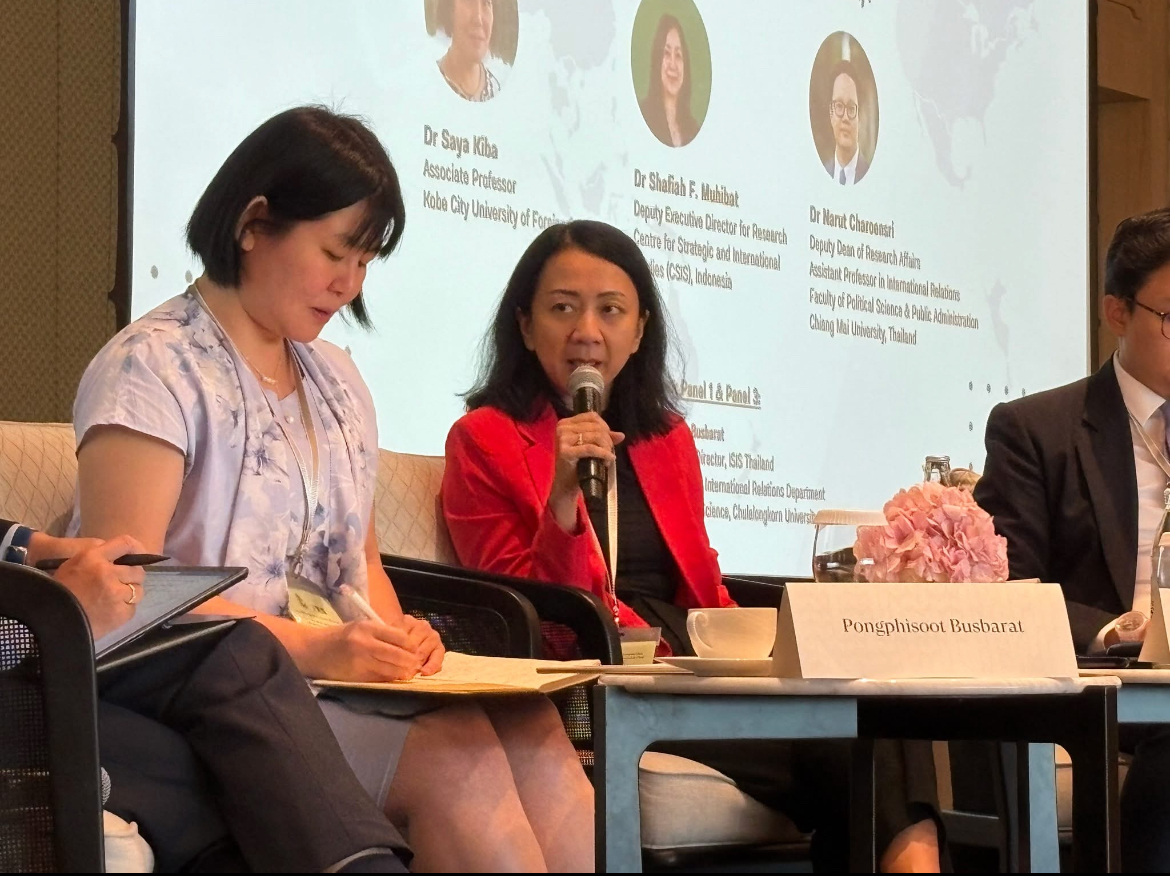On March 13th 2025, the HDFF team attended the conference “The Nexus between Domestic and International Politics : Unveiling the Geopolitical Reconfiguration in the Indo-Pacific”, organized by the Institute of Security and International Studies (ISIS) and held at Dusit Thani Bangkok. The following is a report on the third panel discussion.
Moderator : Dr. Pongphisoot Busbarat, Faculty of Political Science, Chulalongkorn University
Speakers :
- Dr. Saya Kiba, Kobe City University of Foreign Studies, Japan
- Dr. Shafiah F. Muhibat, Centre for Strategic and International Studies (CSIS), Indonesia
- Dr. Narut Charoensri, Faculty of Political Science and Public Administration, Chiang Mai University, Thailand
1) Japan’s New Security Cooperation Policies and Public Opinion
During her first intervention, Dr. Saya Kiba highlighted Japan’s shift toward using Official Development Aid (ODA) for security purposes and capacity-building programs for the Japan Self-Defense Forces (JSDF), alongside the National Security Strategy (NSS) expanding diplomatic and security engagement beyond Asia, after 2022. Given the country’s historical sensitivities, security-related projects have been kept low-profile, and there have been efforts to gauge public support. Different messages were tested, with a combination of Japan’s pacifist constitution, combined with either ODA or NSS proving the most effective, as they conveyed a peaceful narrative. Support was notably higher among elites, while broader public acceptance remained limited, especially in Indonesia. Additionally, testing for partisan alignment in Southeast Asia revealed no clear sense of partnership or political affiliation regarding Japan’s policies.
2) Japan’s Role in ASEAN: Indonesia’s Perspective
Dr. Shafiha F. Muhibat noted that Japan and Indonesia share mutual interests in defense and infrastructure projects, as evidenced by Prime Minister Ishiba’s visit to Indonesia two months prior. However, Indonesia’s recent foreign policy moves have been unpredictable : following his inauguration, the Indonesian president made his first official visit to Washington, only to later issue a joint statement with China and other BRICS members. While President Prabowo’s rhetoric has long emphasized a strategy of engaging “a thousand friends” balancing relations with both the US and China, this approach has yet to translate into concrete investments.
3) Thailand, the Greater Mekong Subregion (GMS), and Japan
According to Dr. Narut Charoensri, Thailand, GMS, and Japan are interconnected through political, economic, and security dynamics, influenced by broader US-China-Japan relations. Thailand faces domestic challenges such as an aging society and cyber threats, while its political landscape is shaped by ideological shifts and global economic pressures. The GMS, as a key regional bloc, plays a crucial role in balancing national and subregional interests, with institutional mechanisms like the Ayeyawady-Chao Phraya-Mekong Economic Cooperation Strategy (ACMECS) fostering cooperation. With geopolitical uncertainties, including the return of Donald Trump to the US presidency, security concerns could drive stronger partnerships between Thailand, Japan, and the Mekong region, reinforcing collaboration on regional stability and economic development.
The discussion was concluded by a question regarding the infrastructure competition between Japan and China in the region. It was discussed that infrastructure development in the region started with Japan after WWII, but China has since become a major player. While both countries compete for influence, China has made more significant strides in the region, with no cooperation between the two. Thailand may lean towards China, while Indonesia remains neutral, with no public preference for the origin of investments.
HDFF would like to thank ISIS Thailand for the invitation to this very comprehensive and informative event.
Photo source : ISIS Thailand


Comments are closed